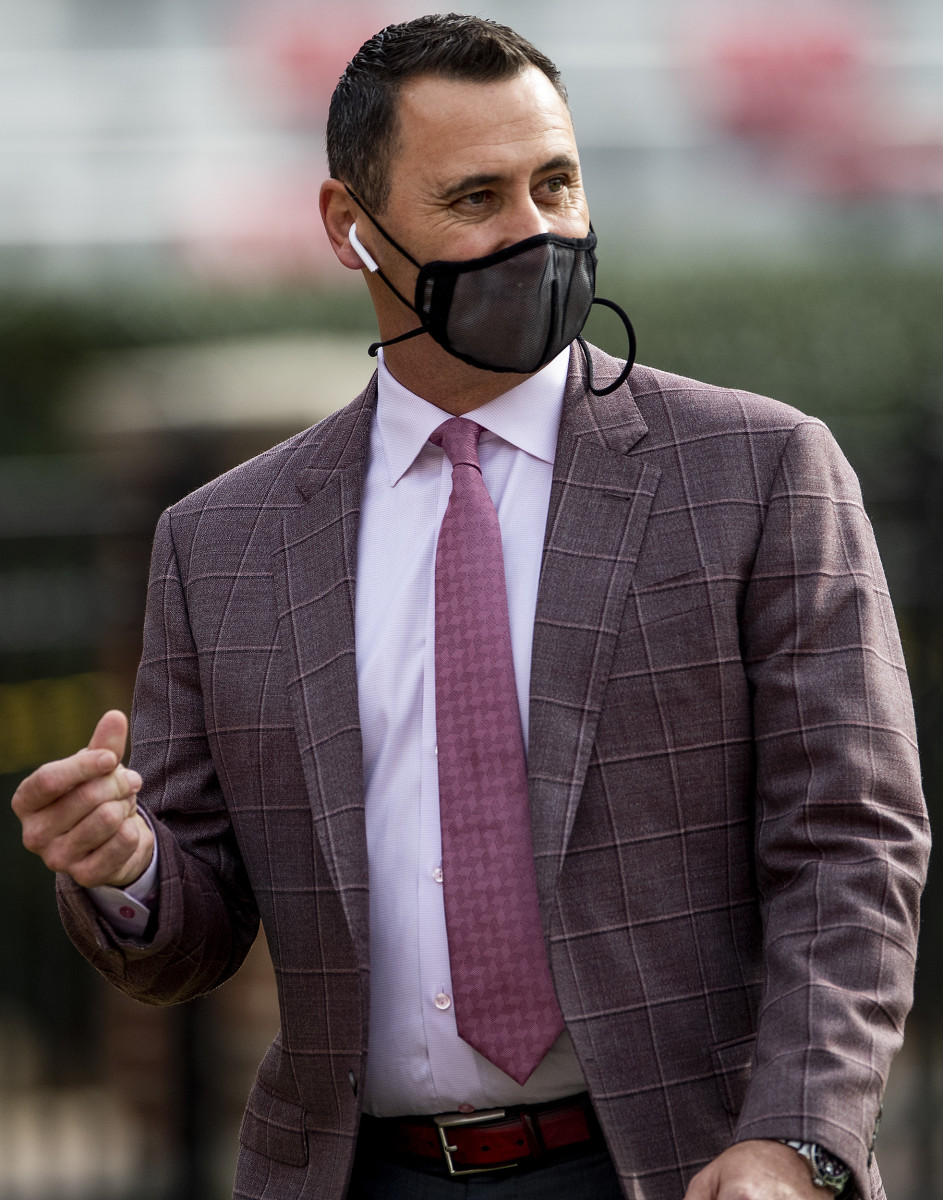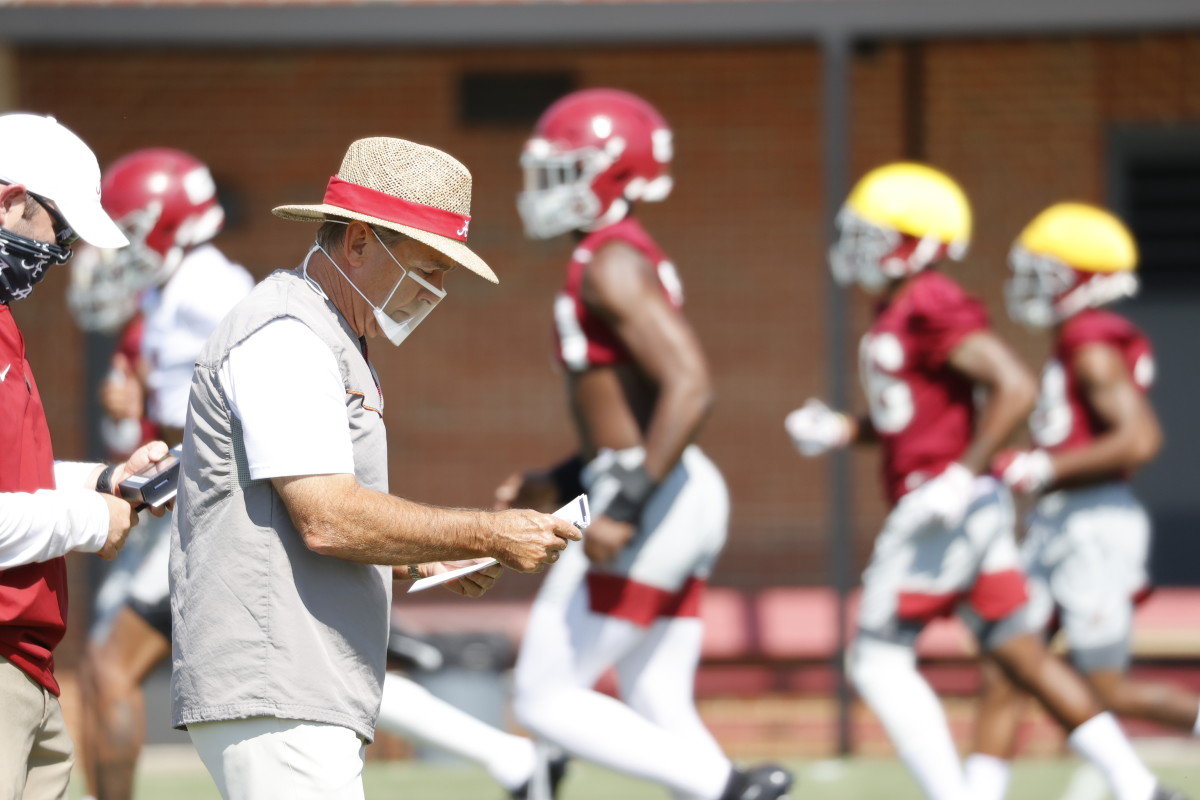Coaching Continuity, Instead of Turnover, Paying Huge Dividends For Alabama
It's nice to be liked, and wanted.
It happens with Nick Saban's coaches at Alabama — a lot — which only makes sense as other programs desperately want a taste of the Crimson Tide’s success as well. In the Southeastern Conference alone there were five of his former assistants with the title of head coach this season, plus others scattered throughout the college football landscape.
So for offensive coordinator Steve Sarkisian to draw interest from other schools during the past offseason was anything but a surprise, especially since he already had head coaching experience.
But Sarkisian said no thanks.
“This is a special place and I came here for stability in my career,” he said.
“I had already left Coach Saban once in 2016 and I just felt like the timing wasn’t right. He’s been too good to me. Alabama’s been too good to me. I love these players. The administration has been tremendous so all in all, we’ve got a lot left to accomplish.”
When the dust eventually settles on the 2020 season, which will almost certainly be remembered as the craziest in the modern college football age, experts and critics will study and argue for years about what factors had the biggest impacts, and translated into success.
One that isn’t getting enough credit, at least not yet, is coaching continuity, from the top on down. It was already a priority for Saban coming out of the 2019 season, but when the coronavirus pandemic accelerated in March it became absolutely vital to this year’s team.
"There are so many uncertainties,” Saban said. “If we'd have had a bunch of new coaches, the players learn the system in the spring. So do new coaches. The coaches learn through the first year of how you do things, whether it's in the summertime, fall camp, game week, whatever, game day.
"I think when you have continuity and people understand what the expectation is, I think it helps in a lot of areas. I think it helps in recruiting. I think it helps in relationships with players. I think it helps with knowledge of the system."
Although Saban is the dean of SEC coaches, as he’s been at Alabama since 2007 and previously at LSU, his entire coaching staff plus the strength and conditioning coach had turned over since the 2017 national championship.
Sarkisian was with Alabama in 2016, primarily as an analyst and promoted to offensive coordinator for the title game. But then he left after getting the opportunity to be the Atlanta Falcons offensive coordinator.
Saban made seven hires for the 2018 season, and six more for 2019 including all new coordinators.
This past offseason, though, he only hired one, defensive line coach Freddie Roach, who played for the Crimson Tide as a linebacker, plus new sports performance coaches to oversee strength and conditioning and the new sports science center.
“What an unbelievable player he was here, but what an unbelievable person,” defensive coordinator Pete Golding said about Roach. “I think the energy he brings to that room, being a little younger, I think the kids relate to him more. But it’s not a buddy system. He’s on their (rears), he’s gonna make sure they do things right.”
Although Roach played for the Crimson Tide in 2002-05, he’s actually not the youngest coach on the staff. Golding is at 36 years old, while Roach and running backs coach Charles Huff are both 37.
That ties into something else that Saban strives for with each coaching staff, diversity. Granted, he considers it important in terms of race, but also with varying degrees of experience.
For example, offensive line coach Kyle Flood was the head coach at Rutgers for four years, and safeties coach Charles Kelly has had an extensive career including four years as Florida State’s defensive coordinator.
“I love Charlie,” Golding said. “It’s so nice to have him here. I mean, holy cow, the experience he’s had.”
Yet for every long-established coach like Sal Sunseri, the linebackers coach who is in the midst of his third career stint with Saban, and special-teams guru Jeff Banks, there’s someone like cornerbacks coach Karl Scott or wide receivers coach Holmon Wiggins, still on the younger end of the coaching spectrum.
Saban does the same with the support staff. While Butch Jones and Joe Pendry are listed as special assistants to the head coach, the analysts range from former head coaches Charlie Strong, Major Applewhite and Mike Stoops, to former Crimson Tide players Nick Perry and Javier Arenas.
It’s at Sarkisian’s spot, though, that the Alabama coaching staff has seen the most turnover of late. Prior to his return in 2019, the Crimson Tide had four different play-callers in as many years — five if you count Sarkisian’s 2016 season promotion.
That would be tough on any quarterback, offense, or team.

"Yeah, definitely it helps,” redshirt junior quarterback Mac Jones said about Sarkisian’s return. “Coach Sark has done a great job calling great plays every game and preparing us really well.
“Obviously, with as many guys as we had back from last year on offense, to step in and kind of just do what I'm supposed to do has been really easy. Because, like we always say, we have the best skill players, best offensive line, best running backs, best tight ends, and a really good offensive coach. So put it all together, and you know good things happen, and we will just continue to do that."
Thus a huge key to Alabama’s offense lighting up opponents, and the defense improving throughout the season.
Sure Alabama had 10 players selected in the 2020 NFL Draft (Jalen Hurts included), all in the first three rounds, and had double-digit draft picks for the fourth straight year. It still had four returning starters on the offensive line, a full stable of running backs, depth on the defensive line, veterans at interior linebacker, plus both a quarterback and wide receivers already in place to step up into larger roles.
The player continuity on top of the coaching continuity put the Crimson Tide ahead of its competition, even the programs that did enjoy some spring football. It also gave Alabama an advantage in dealing with the pandemic, including when Saban nearly missed a game due to a false-positive test, and then did miss the Iron Bowl rivalry game against Auburn (with Sarkisian filling in as necessary).
It also wasn’t a coincidence that of the four SEC teams with new head coaches for 2020, none had a winning record through six games and just one was at .500.
"It's always critical to have continuity but I think especially this year," Saban said.

Alabama Coaching Staff Turnover
• Offensive coordinator: Major Applewhite (2007); Jim McElwain (2008-11); Doug Nussmeier (2012-13); Lane Kiffin (2014-16), Brian Daboll (2017); Mike Locksley (2018); Steve Sarkisian (2019-)
• Running backs: Burton Burns (2007-17); Joe Pannunzio (2018); Charles Huff (2019-)
• Wide receivers: Curt Cignetti (2007-2010); Mike Groh (2011-12); Billy Napier (2013-16); Locksley (2017); Josh Gattis (2018); Holmon Wiggins (2019-)
• Offensive line: Joe Pendry (2007-10); Jeff Stoutland (2011-12); Mario Cristobal (2013-16); Brent Key (2016-18); Kyle Flood (2019-)
• Tight ends/special teams: Ron Middleton (2007); Bobby Williams (2008-15); Cristobal/Burns (2016); Pannunzio (2017); Jeff Banks (2018-)
• Defensive coordinator: Kevin Steele (2007); Kirby Smart (2008-15); Jeremy Pruitt (2016-17) ; Tosh Lupoi (2018); Pete Golding (2019-)
• Defensive line: Bo Davis (2007-10); Chris Rumph (2012-13); Bo Davis (2014-15); Karl Dunbar (2016-17); Craig Kuligowski (2018); Brian Baker (2019); Freddie Roach (2020-)
• Interior linebackers: Kevin Steele (2007-08); James Willis (2009); Kirby Smart (2010-13); Steele (2014); Smart (2015); Pruitt (2016-17) ; Pete Golding (2018-)
• Outside linebackers: Lance Thompson(2007-08); Sal Sunseri (2009-11); Thompson (2012-14); Lupoi (2015-19); Sal Sunseri (2019-)
• Defensive backs: Smart (2007-09); Pruitt (2010-12); Greg Brown (2013); Smart (2014); Mel Tucker (2015); Derrick Ansley (2016-17); Karl Scott (2018-) and Charles Kelly (2019-)
